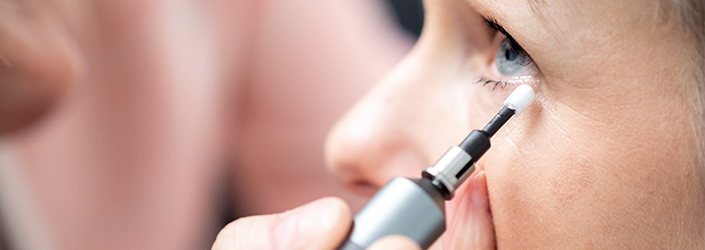Do your eyes feel dry or irritated?
Do certain activities, like reading or computer use make your eyes feel scratchy?
Have you found your contact lenses are gradually becoming less comfortable and your wearing time has decreased?
Do your eyes water excessively?
If your answer is yes any of these questions then you may have dry eyes. Dry eyes is a common problem but you don’t have to live with it! This condition is caused when your eyes do not produce enough tears or your tears evaporate too quickly.
Symptoms usually affect both eyes and often include:
- feelings of dryness, grittiness or soreness that get worse throughout the day
- burning and red eyes
- eyelids that stick together when you wake up
- temporarily blurred vision, which usually improves when you blink
Unfortunately advancing age increases your chance of getting dry eye. It is estimated that up to one in every three people over the age of 65 experiences problems with dry eyes. And that it effects women more than men. (www.nhs.uk/conditions/dry-eyes). However, other factors can cause dry eye including:
- being in a hot or windy climate
- wearing contact lenses
- certain underlying medical conditions, such as blepharitis (inflammation of the eyelids)
- side effects of certain medications – including antihistamines, antidepressants, beta-blockers and diuretics
- hormonal changes in women – such as during the menopause, pregnancy, or while using the contraceptive pill
Depending on the results of our investigations we can advise you on a tailor-made plan to treat your dry eye symptoms. These may include specialist in-house treatments such as Meibomian Gland Expression or BlephEx™ intensive lid treatment, or daily treatments at home including eye drops, compress masks and omega oil supplements
Blepharitis
What is Blepharitis?
Blepharitis is frequently associated with dry eye. Blepharitis is where the edges of your eyelids become red and swollen. It can develop at any age. The symptoms, which are often worse in the morning, include
- itchy, sore, red eyelids that stick together with crusty or greasy eyelashes
- a burning, gritty sensation in your eyes
- increased sensitivity to light (photophobia)
- swollen eyelid margins
- finding contact lenses uncomfortable to wear
Blepharitis is usually a long-term condition so treatment needs to be on an ongoing basis to prevent further damage or problems to your eyes.
Daily cleaning of your eyes to maintain eye lid hygiene will help control the symptoms. At Walker and Campbell we offer both over the counter treatments and BlephEx™ a new intensive lid treatment carried out by one of our specialist optometrists.
This revolutionary treatment for Blepharitis safely cleans and exfoliates your eyelids and lashes. This not only improves your symptoms but also helps avoid long term damage to your eye glands. Depending on your eye condition treatment is recommended every 4 to 6 months.
If you think you may be suffering from Dry Eye or Blepharitis please call us to book a Dry Eye assessment.

